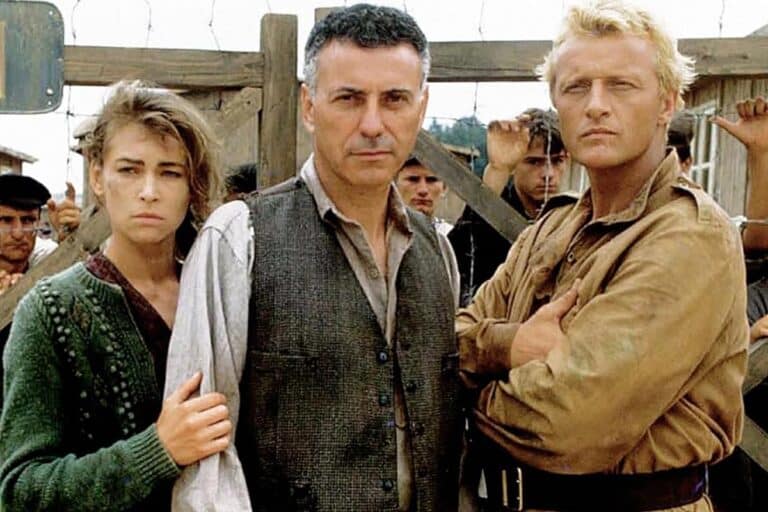
There is certainly no shortage of Holocaust films, but some stand above the others. As we commemorate Yom Hashoah, let’s explore the five most impactful Holocaust films of all time.
5. “Inglorious Basterds” (2009)
Quentin Tarantino’s “Inglorious Basterds” is a revenge fantasy that reimagines history, depicting a world where Hitler doesn’t end his life by suicide. The film stars Brad Pitt as Lieutenant Aldo Raine, who assembles a group known as the Basterds, individuals committed to hunting Nazis. One of them is a Jewish man (Eli Roth) who pummels a Nazi soldier with a baseball bat.
The opening scene is one of the best in film history, with a French farmer meeting SS Col. Hanz Landa (an Oscar-winning performance by Christoph Waltz) who is investigating whether the farmer is hiding Jews.
While the film is obviously not true to history, it taps into a visceral revenge fantasy where Hitler gets what he deserves and meets his end in a movie theater — which is fitting given the Nazis’ use of propaganda films. This audacious narrative might have stemmed from Tarantino’s freedom as a non-Jewish director to explore such a bold revenge fantasy.
4. “Escape From Sobibor” (1987)
This film portrays the harsh realities and the resilience of Jews in Sobibor, a Nazi death camp. Jewish Prisoners of War from the Soviet Army were placed alongside Polish Jews; despite their dire circumstances, the prisoners orchestrated a daring escape.
Led by Sacha Pechersky (Rutger Hauer) and Leon Feldhendler (Alan Arkin), the prisoners lure SS officers under the pretense of trying on new coats or boots and assassinate them one by one. Arkin’s speech telling the prisoners they are free to run is unforgettable, as is the harrowing effort to escape to the forest.
The narrative also highlights individual acts of defiance, like that of Shlomo Szmajzner (played by Simon Gregor), who smuggles weapons into the camp. The final scene of the escape is particularly tough to watch.
Based on the book by Richard Rashke, “Escape from Sobibor” combines elements of thriller, horror, and inspiring drama to depict the ingenuity and courage of Jews who turned the punctuality of their oppressors against them. This true story serves as an invaluable resource for teaching about resistance during the Holocaust.
3. “Life Is Beautiful” (1997)
How could an Italian father keep up the spirits and shield his young son from the horrors of the Holocaust? In Roberto Benigni’s masterful “Life Is Beautiful,” the writer/director also stars as Guido, a man who convinces his son that their internment in a concentration camp is just a complex game for winning points.
The film’s power lies in its juxtaposition of profound love and the absurdity of their dire circumstances; we first see Guido fall in love with his wife, calling her a princess.
Benigni’s compelling performance won him the Oscar for Best Actor. His portrayal makes it impossible not to wonder how one might remain positive if faced with the same dire circumstances. While the film includes moments of humor, it does not sugarcoat the terrible evil that occurred during the Holocaust.
Guido’s relentless optimism and his creative efforts to shield his son’s innocence through an imaginary game are both heartwarming and heart-wrenching. By using comedy as a weapon, he creates an alternate reality for his son, because the true nature of their situation is too horrific to confront.
2. “The Pianist” (2002)
In “The Pianist,” Adrien Brody stars as Wladyslaw Szpilman, a pianist hiding in the Warsaw ghetto. To prepare for the role, Brody reportedly lost about 30 pounds and studied piano intensively. His portrayal, which earned him an Oscar for Best Actor, includes a particularly memorable scene where Szpilman’s family divides a single piece of caramel into six parts.
Brody’s Szpilman uses his intelligence and musical talent to survive in unimaginable circumstances. “I didn’t know the desperation that comes with hunger,” Brody remarked to the BBC.
The film uses Szpilman’s piano playing to highlight the cruel irony of the Nazis’ regime: a cultured man who loves music is persecuted by those who also appreciate these finer aspects of life, yet participate in heinous acts.
Brody’s performance captures a complex blend of emotions — from hopelessness and confusion to a fierce conviction to survive. His transformation from a distinguished musician to a desperate survivor underscores the brutal reality of the Holocaust.
1. “Schindler’s List” (1993)
Based on a true story, this iconic film depicts the gradual transformation of Oskar Schindler from a hedonistic businessman obsessed with wealth to a hero who saved Jews during the Holocaust.
Schindler initially sees the Nazis, including the villainous Amon Goeth (portrayed by Ralph Fiennes), as people he can make deals with. However, his perspective shifts as he witnesses the horrors inflicted upon the Jews.
Liam Neeson is compelling as Schindler, and Steven Spielberg’s direction ensures the film captures his ethical transformation. Ben Kingsley delivers a compelling performance as Schindler’s accountant, Itzhak Stern, who narrowly escapes deportation to a death camp in a tense scene.
“Schindler’s List” had a significant impact and may have even helped to reduce antisemitism for a time. While the film highlights the story of a “righteous gentile,” it does not shy away from depicting the brutal realities faced by Jews under Nazi terror.
Adapted from the book “Schindler’s Ark” by Thomas Keneally, the screenplay by Steven Zaillian won the Oscar for Best Film in 1994, with Spielberg earning the Oscar for Best Director.
